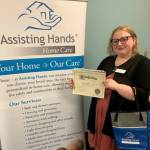Providing care to an elderly individual is demanding of a family member’s time and resources. Add fulltime employment to the mix, and the dual responsibility feels nearly impossible to successfully pull off. Despite the challenges, balancing caregiving with a career can be accomplished with key strategies.
Managing Work and Caregiving is Common
Firstly, it’s important to know that family caregivers are hardly alone. Research shows that about six in 10 family caregivers also work full-time or part-time. By 2025, experts expect that nearly half of the American workforce will be providing care for an individual over the age of 50.
Family caregivers might provide extensive support, including helping an elderly loved one bathe, get dressed and groom. Support could also include preparing daily meals, paying the senior’s bills, managing their finances, and providing transportation to doctor’s appointments.
Here are tactics to balance caregiving with a career.
1. Organize
Organization allows a caregiving plan to move forward seamlessly. Create an online, shareable family calendar so all relatives stay up to date about the senior’s schedules, activities, and appointments. If possible, siblings should be included on the calendar as an integral part of the care team.
2. Find Support
Locate helpful community resources through the local agency on aging. Specifically, research the National Association of Area Agencies on Aging. The Agency can point family members toward adult day care centers, support groups and transportation services, among many other useful services.
Community professionals are also available to assist with elderly home care. A geriatric care manager can help develop a suitable care plan. Turn to a nurse advisor for answers about health-related questions regarding the senior. A mental health counselor can ease family caregiver’s stress.
3. Develop a Network
A safety net of relatives, trusted friends and reliable neighbors is extremely beneficial to both the caregiver and care recipient, especially when work schedules cannot be immediately adjusted. A neighbor, for instance, might prepare lunch, while an in-law monitors the morning medication dose.
4. Discuss Caregiving with a Higher-up
An employer should be aware of the family caregiver’s additional responsibilities at home, which can unexpectedly interfere with work life. Caregivers are advised to formally discuss their extra commitments but assure the employer they remain dedicated to putting in 100 percent at work.
During the conversation with HR or an employer, ask about flexible scheduling, especially if the company policies allow it. A flexible schedule might simply mean working remotely a few days per week, taking time off as needed or adjusting one’s work hours.
Talk about the caregiving situation early rather than wait for an emergency to prompt the discussion. Needing to telecommute or change work hours will require plenty of transition time. Be sure to develop a plan with a supervisor and coworkers if a caregiving emergency requires leaving work early.
5. Consider Job Sharing
A job-sharing arrangement may be ideal when caregiving responsibilities combined with a demanding work schedule become too overwhelming. Job sharing occurs when two individuals fulfill the requirements of one job, which satisfies the employer and gives the caregiver a few extra hours.
6. Telecommute
Some types of work may be completed out of the office and in another location, like the senior’s home. Employees can collaborate with colleagues by phone, via email or video technology and fulfill the day’s job requirements, while still having an opportunity to monitor an elderly loved one’s condition.
7. Utilize FMLA
Employees can take some time off from work per the Family Medical Leave Act (FMLA) in order to care for a loved one. The FMLA allows the employee to take off 12 weeks per year without pay. Not all employees are eligible, and they will have to meet some requirements.
Accrued vacation days may have to be used up prior to taking FMLA leave. Employers should maintain the employee’s group health insurance coverage during the FMLA leave. All 12 weeks of FMLA leave do not have to be taken at once; employees may take partial leave at different times.
The employee must work for a company with at least 50 employees, a government agency or school to be eligible for FMLA. Be aware that state laws vary. Prior to taking time off via FMLA, the employee must have worked for the company for at least 12 months.
8. Hire Home Care
When employees are simultaneously needed at work and at home, hiring a professional home care agency is often the best solution. Professional caregivers arrive on schedule each day to assist the elderly with the activities of daily living, like bathing, eating, grooming and toileting.
Formal respite care arrangements relieve family caregivers. When experienced professionals are caring for the senior, families are gifted with peace of mind. Home care services are flexible and may be hired for the short-term, such as in respite care, or for the long-term, such as in 24-hour or live-in care.
Working while caregiving offers its own benefits. Family caregivers enjoy an identity outside of their caregiving role. They can focus on an aspect other than caregiving. But when balancing work and caregiving is overwhelming, families can turn to Assisting Hands.
Work with a Local Home Care Agency
As a local home care agency with a team of licensed and bonded caregivers, Assisting Hands is available to provide respite care to families. Our elder care services are comprehensive and include assistance with the activities of daily living, transportation to doctor’s offices, and grocery shopping.
Assisting Hands also specializes in Alzheimer’s and dementia care, fall prevention, and companionship. While our services are non-medical in nature, our professional caregivers provide timely medication reminders and a range of other forms of non-medical healthcare to support seniors. Families with seniors living in the surrounding communities of Park Ridge, Illinois, are encouraged to consult Assisting Hands for the most compassionate, dependable home care in the area. We’ll create a customized care plan to ensure your aging loved one receives full support at home.
Get a Free Estimate
Give us a call at (847) 796-6685 for a free consultation regarding our home care services in the Park Ridge, IL area.







